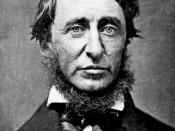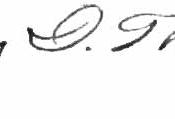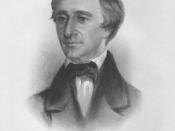The early 19th century ideas of transcendentalism, which were introduced by Ralph Emerson and David Thoreau, where man as an individual becomes spiritually consumed with nature and himself through experience are contrasted by Emily Dickinson, who chose to branch off this path by showing that a transcendentalist experience could be achieved through imagination alone. These three monumental writers set the boundaries for this new realm of thought. Although these writers ideas were not similar, they all followed the simple idea that "the universe is composed of Nature and the Soul" . The male perspective seen through the works of Thoreau and Emerson, where nature "refers to essences unchanged by man; the air, the river, the leaf" , is revised and satirized by Dickinson's statement that "Of all the Souls that stand create-, I have elected- One" . Dickinson's works were meant to taunt society by showing how a woman, ironically trapped in her "natural" surroundings of the home, could obtain as much power, if not more than any male writer.
This ironic revisions of ideas is directed at all male transcendentalists and figures in society.
Both Ralph Emerson and David Thoreau used societies stereotype of the true male environment, "nature", to draw their power and write from their experiences. Experience was the most important factor to these writers. The ability "to know it by experience, and be able to give a true account in my next excursion" was the basis of all their writings. "To get the whole and genuine meanness of it, and publish its meanness to the whole world" was their goal behind all their writings. They did not use their power of writing in order to gain a transcendentalist experience, but rather to record them. Both Emerson and Thoreau chose to contact their true natural surroundings,


